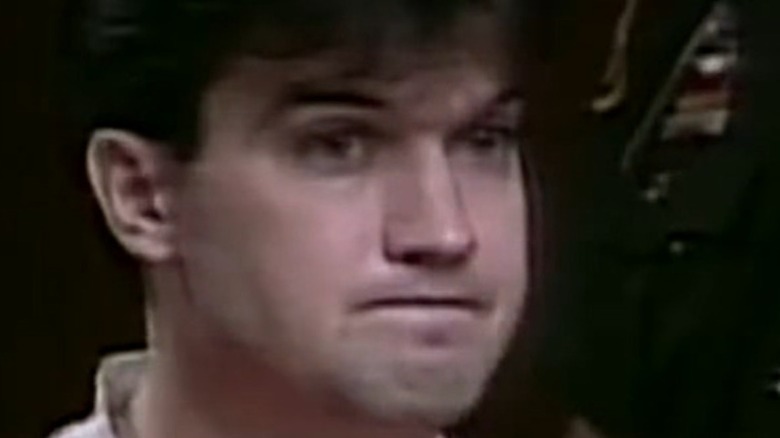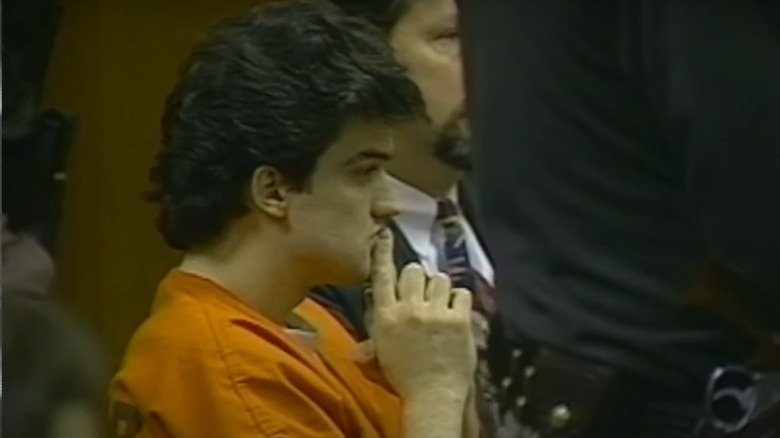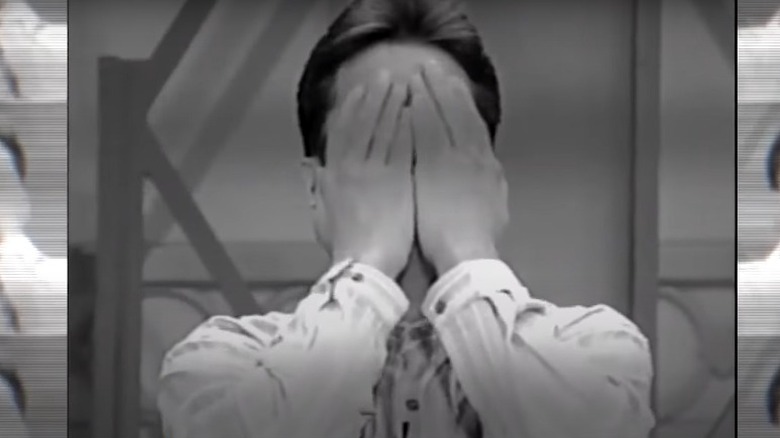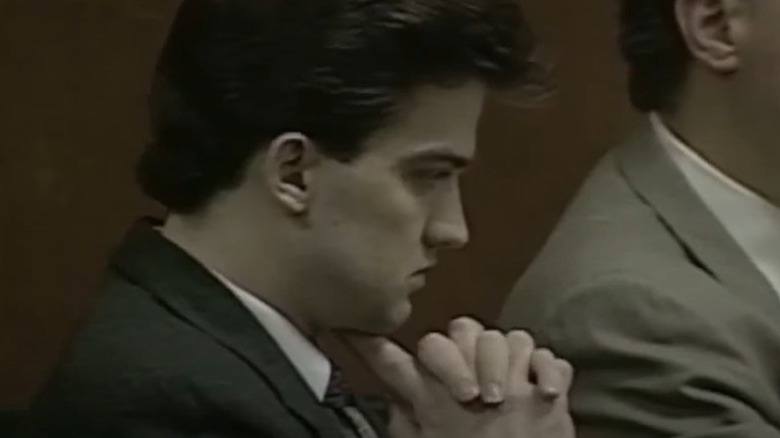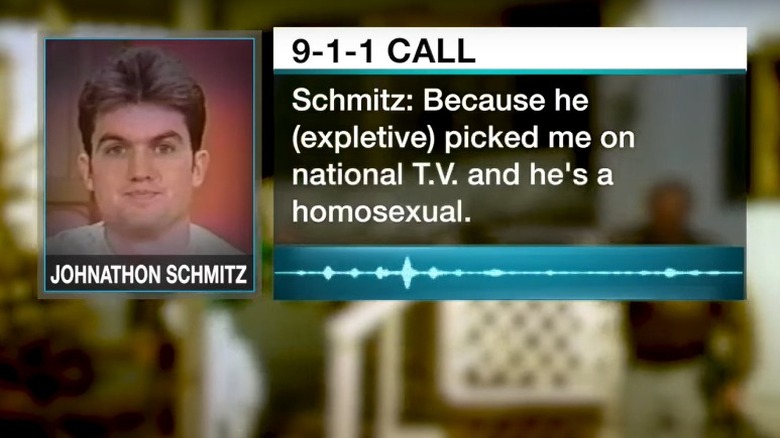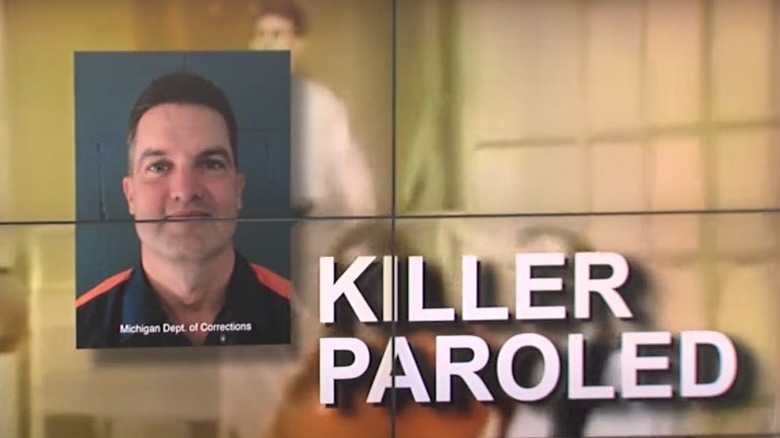Tragic Details About The 'Jenny Jones' Murder
The weekday afternoons of the 1990s were busting at the seams with a wide variety of daytime talk shows. Though sometimes insightful — with Montel Williams' show airing episodes titled "School Desegregation" and "My Boyfriend Thinks He Owns Me" (per IMDb) — the outrageousness seemed to blossom as the decade wore on. With hosts like Jerry Springer having episodes titled "I'm a Breeder for the Klan" and "Big Busted Strippers" (via IMDb), any bastion of dignity in this genre of daytime television appeared to be rapidly evaporating.
Though these talk shows could be as zany as they were outrageous, no one probably ever imagined that one episode of a daytime talk show would result in the brutal and tragic murder of one of its guests. What was even more unpredictable is the fact that this guest was murdered by someone he shared the talk show stage with just before he died (per The Washington Post). Known sometimes as "The Jenny Jones Murder," the death that occurred after the taping of an episode of the popular show made headlines across the nation. It left one innocent man dead at the hand of one of his closest friends and mired the talk show in lawsuits over the years (via The Washington Post).
Jonathan Schmitz was lured onto the show by a female friend
Jonathan Schmitz was 24 years old when he was approached to be a guest on an upcoming episode of "The Jenny Jones Show." The episode was titled "Secret Crush," and Schmitz was informed by the show's producers that someone they brought onto the show would reveal on national television that they had amorous feelings for him. CNN reports that Schmitz was led to believe that his secret crush was a female friend of his, though he was reportedly told by producers that this crush could be a man or a woman.
During the show's taping, Schmitz's friend and neighbor went on stage first and told Jones and her studio audience about the feelings the crush had for Schmitz. Unbeknownst to Schmitz, who was waiting backstage at the time, this crush was not his female friend, Donna. Rather, it was Scott Amedure. When Schmitz was called to the stage, he was immediately told by Jones that it was Amedure who had a crush on him and not their friend Donna who had accompanied them to the show. Schmitz seemed to take the news in stride at first, though the more details about the crush that were revealed, the more embarrassed Schmitz visibly became.
The two men hung out together after the show's taping
Though there weren't any fireworks on the stage, many who viewed the episode could see how Jonathan Schmitz was becoming more and more uncomfortable. But despite this, Schmitz and Scott Amedure flew back home to Michigan together after the taping. Warner Brothers reports that the two men were friends before the taping and that this seemed to be the case when they left to go back home.
In fact, Schmitz and Amedure went out drinking together when they returned home. Things appeared to be okay between the two men, even after Amedure had professed his feelings for his friend in front of a studio audience. To add to the sense of normalcy, the two friends even made plans to go shopping together the following weekend, lending even more credence to how things were settling back into the way they were before their appearance on the talk show. But things were about to take a drastic turn for the worse. Several days after the returned home, Amedure left a blinking light on Schmitz's porch. According to The Atlanta Journal-Constitution, accompanying this light was a sexually explicit note that he had written for Schmitz.
Schmitz killed Amedure with a shotgun
When Jonathan Schmitz arrived home and found the blinking light with the note that Scott Amedure left him, it's hard to say what went through his head. Though it was later alleged that the two men had experienced a sexual encounter together after the taping, this was never proven (per Film Daily). Were it true, it might have added to the deteriorating mental state of Schmitz, which his attorneys would later argue as part of his defense.
What we do know for sure is that when Schmitz found the note, he left to withdraw money from a nearby ATM. He used this money to purchase a shotgun, which he took with him to the mobile home where Amedure lived. Schmitz arrived at Amedure's home and questioned him about the note. He then went to his car, retrieved the shogun, and shot his friend twice in the chest at close range, killing him.
Schmitz was originally charged with first-degree murder
After the murder, Jonathan Schmitz left the scene to phone 911. Yahoo News reports that in his call to emergency dispatchers, Schmitz stated, "I think I just shot a man. I think I just shot this guy." Initially charged with first-degree murder, Schmitz was arrested and interrogated. His defense didn't dispute that their client pulled the trigger that killed Scott Amedure. Rather, they argued for his innocence by way of his diminished mental health.
This was enough to get Schmitz convicted only of second-degree murder after his 1996 trial. Schmitz appealed his guilty conviction, his defense claiming that a jury selection error warranted a mistrial. The Washington Post reports that this initial conviction was overturned, and a new trial was ordered. Schmitz was retried in 1999 for the murder. That jury returned the same verdict, finding him guilty of second-degree murder. He was sentenced to 25 to 50 years in prison.
The controversial episode never aired
Though full of a studio audience that was fully engaged in the show's "shocking" revelations, the episode that featured Jonathan Schmitz and Scott Amedure never did air on television. Still, the Detroit Free Press confirms that while the ill-fated taping was kept off the airwaves, pertinent clips from the episode did air on various news segments.
Whether the show didn't air out of respect for the murder victim and his family or because of the arguable poor taste that it would show, there are still multiple places to view the entirety of the segment involving Schmitz and Amedure online. Should you watch the unaired show on your own, you'll see a segment unwind in the same fashion as many other daytime talk shows did during the 1990s. It starts with a "shocking reveal" to a guest that is intended to embarrass as much as it is to gleefully entertain members of the studio audience. And though the constant and raucous cheers from the crowd that day echoed other shows of this caliber, this one led to something that others in the industry did not — the brutal and tragic murder of one of its guests.
Schmitz claimed he was humiliated by the show
When you watch the tape of the show, you can see how embarrassed Jonathan Schmitz is by the revelation that his "secret crush" was his friend, Scott Amedure. Jenny Jones herself didn't help the situation any by continuing to grill Schmitz about whether or not he had feelings or attraction toward his friend. Insisting that he was "definitely heterosexual," it seemed apparent that Schmitz wanted to put an end to the discussion (via Yahoo News).
Whatever actually transpired in the three days between the taping and the murder is a little murky. Whether it was a delayed reaction to the embarrassment Schmitz claimed he felt because of the show or because of an alleged sexual encounter between the two men that happened soon after, something prompted Schmitz to murder his friend. In the call to 911 after he pulled the trigger, the dispatcher asked Schmitz why he killed his friend. Per Esquire, his response was simply, "Because he played a very f****** bad thing on me. He took me on 'Jenny Jones.'"
Prosecutor Richard Thompson outlined the case for the courtroom, claiming that "The Jenny Jones Show" had humiliated Schmitz, who in turn murdered Amedure.
Did Jones think the show was responsible for the murder?
Newsweek reports that Jenny Jones herself has rarely mentioned the topic of the murder publicly and only given a small number of interviews on the subject. The news outlet reports that Jones gave an interview in 1999 to the show "Dateline," in which the murder was discussed. Jones made it very clear that she did not feel personally responsible for the murder of Amedure. She told her interviewer, "The headlines were that they [the producers] ambushed him ... If I hear that world ambush one more time, I want to just scream because I knew that it wasn't."
The former talk show host claimed that Jonathan Schmitz could have backed out of doing the show at any point, but he wanted to make an appearance. Even though he believed that his "secret crush" was his friend, Donna, Schmitz was allegedly told that he could be the object of attraction to either a male or female. Knowing this, Schmitz still insisted that he wanted to go ahead with the taping. Certainly, the fact that both the murderer and the murder victim seemed to be going on with their friendship after the taping is worth pointing out. But some might feel as though the talk show producers could have performed better due diligence in making certain that their guest was mentally stable.
Schmitz experienced mental health issues
Jonathan Schmitz's attorneys argued that he was not responsible for the murder of Scott Amedure due to his mental instability. The Washington Post reports that the defense laid out a case for Schmitz's mental health issues, including a manic depression diagnosis and a long history of unsuccessful suicide attempts. The team claimed that Schmitz was the victim of abuse. His attorneys detailed at least one such instance of physical abuse and humiliation that Schmitz suffered at the hands of his father. The elder Schmitz had beaten his son with a belt in front of his 6th-grade class.
The defense also introduced evidence that showed that Schmitz had Graves' disease. This condition is rooted in a person's thyroid and is an autoimmune condition. The immune systems of people with this disease attack healthy parts of their bodies. Aside from making a person feel sluggish and creating sleeping issues, Graves' disease is also known to cause anxiety (per Thyroid Eyes). CBS News also reports that Schmitz experienced substance abuse issues with alcohol.
If you or someone you know is struggling with mental health, please contact the Crisis Text Line by texting HOME to 741741, call the National Alliance on Mental Illness helpline at 1-800-950-NAMI (6264), or visit the National Institute of Mental Health website.
If you or anyone you know is struggling with addiction issues, help is available. Visit the Substance Abuse and Mental Health Services Administration website or contact SAMHSA's National Helpline at 1-800-662-HELP (4357).
Amedure's family was denied a victory in civil court
Scott Amedure's family decided to pursue civil damages against "The Jenny Jones Show" and its owner, Warner Brothers, in court. After a lengthy 1999 trial, they were awarded more than $25 million by the jury. Needing at least eight of the nine jurors to award damages, the jury returned an 8-1 verdict. Amedure's family was to receive $6500 for funeral reimbursement costs, $5 million for the suffering Amedure experienced before he died, $10 million for the loss of his companionship, and an additional $10 million for the loss of his potential earnings (via CNN).
The Amedure family's victory was a short-lived one, however. In an appeals court ruling in 2002, a panel of judges ruled 2-1 to reverse the lower court's decision. The court declared that the show and its host had no duty to "anticipate and prevent" the murder, which occurred three days after the ill-fated episode was taped (per Variety).
Until the murder, talk shows didn't use psychological profiling for guests
One might think that with the various seemingly unhinged individuals that appeared on talk shows during the 1990s, there would have been more tragic incidents. Most of these shows didn't really have a rigid screening process at the time, and psychological profiles were not the norm to weed out potential issues from guests.
After the jury handed the Amedure family a victory in court following their first suit against Warner Brothers and "The Jenny Jones Show," the plaintiffs' attorney had harsh words for the daytime talk show industry. CNN reports that Geoffrey Fieger made a statement condemning the very nature of the shows themselves, claiming that they take advantage of their guests' emotions and exploit them emotions for the entertainment of the viewers.
Years later, in an interview with Oxygen, Fieger reported that because of Scott Amedure's murder, talk shows began to change their screening processes when it came to potential guests. This included a level of psychological profiles. It's argued that if a psychological profile had been performed on Jonathan Schmitz, who had a serious history of mental illness, he might have been eliminated as a guest.
Amedure's murder shed a light on homophobia in America
The "gay panic" defense that Jonathan Schmitz's legal team employed to attempt to exonerate their client isn't something that is looked upon with much respect today. In decades past, it was seen as a reasonable defense for tragic overreactions to someone being uncomfortable with members of the same sex admitting attraction to them.
The American Bar Association defines the gay panic defense as a "legal strategy which asks a jury to find that a victim's sexual orientation or gender identity is to blame for the defendant's violent reaction, including murder." Though mental illness can surely be attributed to many crimes that are committed against innocent people, the attempt to justify violence against another human being just because it's revealed that they are LGBTQ+ is considered archaic and is slowly being banned as a legal defense.
The ABA reports that as of 2019, eight states have banned the gay panic defense, with more bills being considered in other legislatures. But a 2016 analysis performed by the Williams Institute at the UCLA School of Law revealed that nearly half the states had court opinions that used this defense tactic (via The Guardian). Would the prohibition of gay panic as a defense have saved the life of Amedure in 1995? Most likely not. But perhaps if he was in a world where a person's sexual orientation wouldn't have been the source of alleged embarrassment for another, Amedure would still be alive today.
Schmitz was released on parole in 2017
In March 2017, Jonathan Schmitz found himself up for parole. Though he could have been kept behind bars until 2037, the parole board granted his early release from prison in August 2017 (per CBS News). People Magazine tells us that Schmitz was eligible for release after serving only 22 years of his sentence due to the credit he earned for good behavior while he was incarcerated.
Scott Ademure's surviving older brother, Frank, told the outlet that his family wasn't even made aware of the parole board hearing until after it had already happened. Frank went on to say that, though he wished Schmitz would have been old and gray before he was released, he and some of his family members do empathize with him a bit. The elder Ademure stated that he could see how Schmitz had been victimized and that he felt as though "The Jenny Jones Show" carried equal blame in the murder. He told People Magazine, "Their people are criminals for what they did. Jonathan Schmitz was sort of like a fall guy in their conspiracy." Frank also hoped that Schmitz had overcome his homophobia and was able to receive the psychological help that he needed.
As for Schmitz today, he is reported to be living back in Michigan, doing his best to stay out of the public eye and off everyone's radar (per Oxygen).
